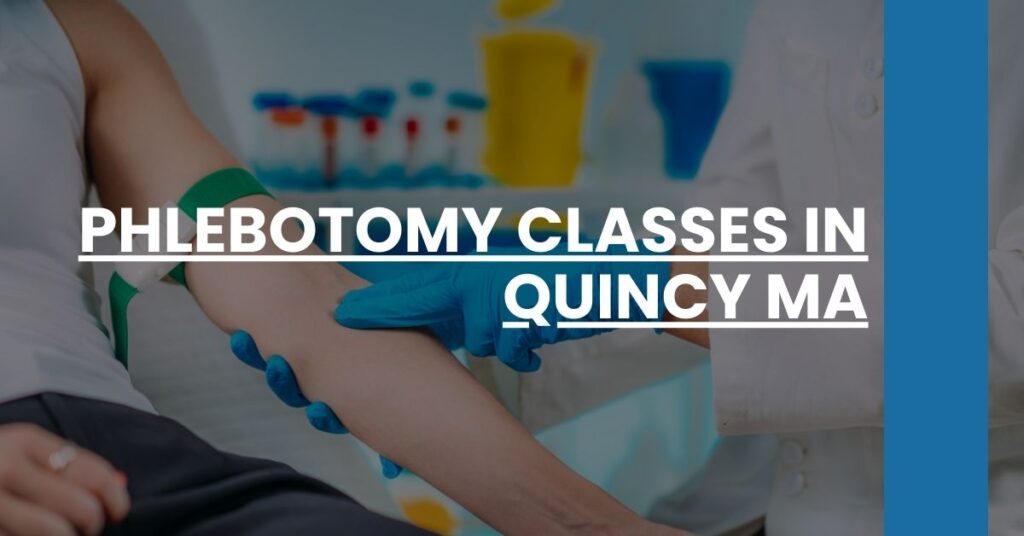Not in Quincy? Check out our lists of Phlebotomy Classes in Boston, Brockton, Cambridge, Lowell, Lynn, New Bedford, Springfield, Worcester, and across Massachusetts.
Are you searching for the best phlebotomy classes in Quincy MA?
Finding the right program can set the stage for a successful healthcare career.
This article highlights the top schools offering phlebotomy training in Quincy MA, detailing their unique features and practical benefits.
Discover essential information on hands-on training, program length, and more to help you make an informed choice.
Quincy College – Phlebotomy Certificate Program
Quincy College offers a fantastic Phlebotomy Certificate Program. This 10-month course covers key skills for entry-level positions in healthcare. You’ll learn both routine and advanced venipunctures, as well as capillary skin punctures.
Key features of this program include:
- Hands-on training: Practice venipuncture and capillary punctures on live patients/volunteers.
- In-depth curriculum: Courses delve into the human cardiovascular system and basic hematology.
- Clinical practicum: Obtain practical experience in a real-world setting.
- Flexible scheduling: Classes are available at both Quincy and Plymouth campuses.
Admission requires satisfactory health and immunization records. Maintaining a passing grade of 73% or above is essential for success in this program.
This course is an excellent step toward a career in healthcare or further academic study in Health Sciences.
Quincy College – Phlebotomy Career Training Certificate Program
If you’re looking for a quicker route, consider the Phlebotomy Career Training Certificate Program at Quincy College. This 8-week intensive course combines classroom instructions with 120 hours of field training.
Key highlights include:
- Comprehensive curriculum: Learn essential phlebotomy skills and theory.
- Full funding options: Qualify for funding from MassHire Career Centers if you meet unemployment criteria.
- National certification: Eligible to sit for the national certification exam upon completion.
- Convenient schedule: The next session runs from June 3, 2024, to July 19, 2024, and includes a 3-week externship.
Contact Karen Manning at kmanning@quincycollege.edu or Natasha Simon at nsimon@quincycollege.edu for more details.
This program is perfect for those who need an affordable, accelerated pathway into the phlebotomy field.
Massasoit Community College – Phlebotomy Certificate Program
Massasoit Community College offers a Phlebotomy Certificate Program designed to prepare students for entry-level positions in phlebotomy and laboratory services. This one-semester course provides a balanced mix of classroom education and practical experience, ensuring you develop essential skills for the job.
Key Features
- Comprehensive Instruction:
- 56 hours of classroom education
- 120-hour practicum
- Curriculum Coverage:
- Venipuncture and skin puncture techniques
- Special blood collections and specimen handling
- Waived laboratory testing
- Safety and infection control practices
- National Certification Eligibility: Opportunity to sit for the American Society of Phlebotomy Technicians (ASPT) certification exam upon successful completion.
- Flexible Class Options:
- Option 1: April 2 to June 28, 2024 – Tuesday and Thursday classes at the Canton campus
- Option 2: May 4 to July 15, 2024 – Saturday classes at the Middleborough Campus
This program is well-rounded, offering the hands-on experience essential for a career in phlebotomy. Visit Massasoit Community College Phlebotomy Certificate Program for more details.
What to Consider When Choosing a Phlebotomy Class
Selecting a phlebotomy class involves several factors to ensure you receive the best training and education.
Key Considerations
- Accreditation:
- Verify the program is accredited by a recognized institution. Accreditation ensures the quality of training and eligibility for certifications.
- Cost:
- Compare tuition fees and additional costs such as books, uniforms, and supplies.
- Look for financial aid, scholarships, or funding options like MassHire Career Centers.
- Instructor Experience:
- Instructors with practical, real-world experience can offer valuable training and insights.
- Internship Opportunities:
- Programs that include clinical externships or practicums provide essential hands-on experience, preparing you for job readiness.
- Job Placement Rates:
- Investigate the program’s job placement success.
- High placement rates often indicate strong industry connections and effective preparation.
Additional Factors
- Program Duration and Schedule:
- Assess whether the class schedules fit your personal obligations.
- Flexible options can be crucial if you have other commitments.
- Course Content:
- Ensure the curriculum covers all necessary phlebotomy skills and practices.
- Admission Requirements:
- Check prerequisites or admission requirements to ensure you qualify.
Taking these factors into account will help you choose a program that matches your career goals and personal circumstances.
Making the Leap into a Phlebotomy Career
Entering the field of phlebotomy starts with choosing the ideal training program. By considering factors like accreditation, cost, and practical training opportunities, you can select a program that equips you with the skills and knowledge necessary for a successful career. Whether you choose Quincy College or Massasoit Community College, your pathway to a rewarding career in healthcare is just a course away.

